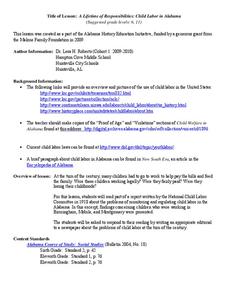Alabama Department of Archives and History
Alabama Farm Life in the Great Depression
The Great Depression not only impacted city folk and factory workers, it also had a profound effect on farmers. Young historians examine primary source materials that document the struggles of Alabama farmers during this time and then...
Alabama Department of Archives and History
An African American Represents Alabama during Reconstruction
The era after the Civil War saw a flourishing of African Americans exercising their rights. Using graphic organizers and Internet research, pupils consider the legacy of Benjamin Sterling Turner, who sat in Congress. Afterward, they...
Alabama Department of Archives and History
Nellie Bly to Dr. Peter Bryce: 19th Century Asylum Reform
What kind of treatment could a patient expect in an asylum during the 1800's? The abusive and neglectful conditions in 19th century asylums are the focus of a lesson that examines the work of reformers Nellie Bly, Dorothea Dix, and Dr....
Curated OER
Bears and Panthers Aplenty: Early Settlers Make a Home in Arkansas
Young historians research the Southwest Trail, which ran through Arkansas back in the 19th century. Pupils are divided into four groups. Each group researches a pioneer who blazed the Southwest Trail. Then, the group presents an oral or...
Alabama Department of Archives and History
Alabama Tenant Farmers and Sharecroppers, 1865 to Present
The tenant farming and sharecropping systems that developed in the South after the Civil War, the reasons for their development, and the eventual decline of these systems are the focus of this two-day plan.
Alabama Department of Archives and History
Alabama's 1901 Constitution
"We, the People of the State of Alabama. . ." Did you know that the Alabama State Constitution has 357,157 words while the US Constitution has only 4,400? And that it has 798 amendments while the US Constitution has 27? Class groups...
Alabama Department of Archives and History
Voting Rights for Alabama Women
What were the arguments put forth by those who opposed the 19th Amendment? For those in favor? Class members examine primary source materials that illustrate the intense debate in Alabama about women's suffrage.
Curated OER
A Practical Experiment In Colonization
Role-play and simulation exercises are fantastic ways to help learners understand the reality behind many social and historical events. Pretending they are colonists, upper graders choose a location, create a history, establish laws, and...
Alabama Department of Archives and History
A Lifetime of Responsibilities: Child Labor in Alabama
Imagine children working long hours in factories, coal mines, and in the fields. Class members examine a series of pictures and read about early attempts to regulate child labor and current child labor laws.
Alabama Department of Archives and History
Changes in Transportation over Time
Planes, trains, and automobiles. How many ways to travel are there? Scholars learn about modes of transportation in the past and how they have changed over time. Budding historians view a timeline, participate in group discussion, and...
Alabama Department of Archives and History
New Deal Programs in Alabama
New Deal programs are the focus of an activity that prompts middle and high schoolers to consider the end of the Great Depression. Groups examine primary source materials to gain an understanding of how these programs were implemented in...
Alabama Department of Archives and History
New York Times Co. v Sullivan: The Alabama Case that Changed Libel Law
Malice aforethought? Can the New York Times be held libel for false claims appearing in its ads? The Supreme Court case New York Times v Sullivan changed the interpretation of the First Amendment. Class members examine these changes and...
Alabama Department of Archives and History
The Great Depression - Hard Times Hit America
To gain an understanding of how the Great Depression affected everyday citizens, class members examine letters written either to the president or to the governor of Alabama asking for assistance.
Alabama Department of Archives and History
W.E.B. DuBois, Booker T. Washington, and Jim Crow
Class members use the think-pair-share strategy to compare the views of W.E.B. Du Bois and Booker T. Washington and to consider how each man's backgrounds influenced his philosophy.
Alabama Department of Archives and History
Working in Birmingham's Iron Industry
What did railroads, iron, and industry contributed to Birmingham's successful growth? The instructional activity explains how the iron industry worked. It also describes how the location of Birmingham and its proximity to railroads....
Pulitzer Center
China's Rising Labor Movement
Young historians will explore the complex causes and effects of industrialization in China by perusing the numerous articles included in this webpage. Throughout the resource, there are many writing and discussion prompts to help direct...
Curated OER
An Introduction to Counting in Swahili
Create and illustrate individual books that aid young learners in learning to count 1-10 in Swahili. They discuss and appreciate a different culture, and find out about Africa through illustrating individual books.
Curated OER
Beary Necessary Rules
Young pupils learn about classroom rules as they also practice active reading strategies and reading comprehension skills. This instructional activity begins with a thorough reading of the story Brown Bear, Brown Bear, What Do You...
Curated OER
Jefferson vs. Franklin: Revolutionary Philosophers
Students examine the contributions of Benjamin Franklin and Thomas Jefferson to American Independence. In small groups, they conduct Internet research, read and discuss primary source documents, and complete a chart.
National Endowment for the Humanities
The Victor's Virtue: A Cultural History of Sport
Pupils explore the meaning of the ancient Greek word aretê and the place of virtue in historical athletic competition and modern sports. They begin by reading an informational text on the goal of sports in education, and then evaluate...
Curated OER
The Effects of Slavery
The emotional and spiritual oppression of slavery in the African-American experience is the focus of this lesson. Middle schoolers analyze various texts by Frederick Douglass and Maya Angelou related to freedom and oppression. They use...
Curated OER
Lessons in Looking: Contraband in Paintings
Using the paintings On to Liberty and A Ride for Liberty, 10th graders analyze historical perspectives on life after the Civil War. They attempt to determine what the Civil War meant for free slaves, then read a paragraph highlighting...
Curated OER
"In Defense of My Race and Country": African-American Soldiers on Why They Are Fighting
Why would an African-American slave fight in the Civil War? Read and analyze primary source documents to understand the ex-slave perspective on fighting in the Union Army. Everything to complete this lesson is included.
Curated OER
Six Day War
Learn about the diverse perspectives involved in the Six Day War by having learners examine and annotate presidential speeches given by the three nations—Egypt, Israel, and the United States—at the heart of the conflict and producing...

























